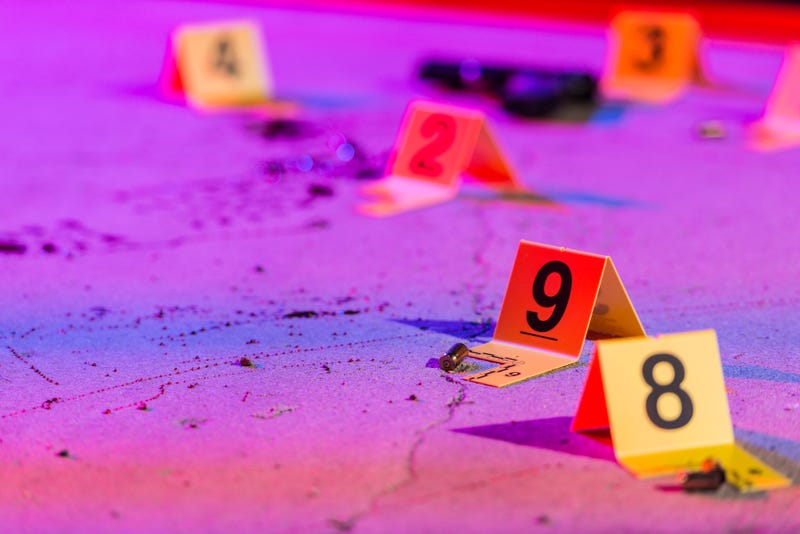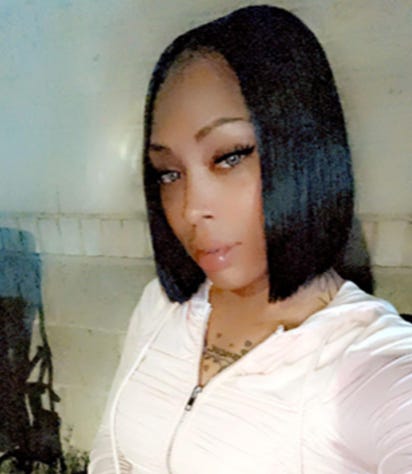
CHICAGO (WBBM NEWSRADIO) -- Chicago police are continuing to gather clues and leads to try to figure out who was behind the latest mass shooting that left four people dead and four others wounded early Tuesday in Englewood on the South Side.
According to Chicago police, the four people - three women and a man - were pronounced dead shortly before 6 a.m. at the scene, a two-story house with a gray stone front in the 6200 block of South Morgan Street.
Chicago police spokesman Tom Ahern initially said all four were women, but he was corrected by Police Supt. David Brown at a news conference.
Four other people were taken to hospitals, at least two of them in critical condition:
• A woman was taken in critical condition to the University of Chicago Hospital.
• A 23-year-old man went to St. Bernard Hospital with a gunshot wound to the back. He was taken to University of Chicago Hospital also in critical condition.
• A man suffered a gunshot wound to the back of the head was was taken to Christ Hospital.
• A 25-year-old man suffered a gunshot wound to the back of the head. He was also taken to Christ.
A 2-year-old girl was taken from the home and brought to Comer Children’s Hospital for observation, but did not appear injured, fire officials said.
Chicago Police Superintendent David Brown said a witness reported hearing gunshots around 2 a.m. and then again after 5:30 a.m., around the time officers arrived to find the eight victims.
Brown said the ShotSpotter system alerted police to gunfire near the Morgan address around 2 a.m., but did not say if police responded to the alert.
So far, police have no suspects.
“We have a drum magazine, which is a large capacity magazine for a gun. Not a gun. Several casings inside the house. No apparent forced entry inside the house," Brown said.
There was no sign of forced entry, Brown said. At least one of the victims likely lived at the address, but Brown did not elaborate on the relationships of the victims and the shooter.
Brown said the victims taken to hospitals had not yet been interviewed by detectives, and the investigation still was “very preliminary.”
He said there was a loud party at the home and then gunshots.
“All we know about this residence is there’s been several calls there for disturbances. Overall, the block where this residence is located is fairly quiet, not much activity going on that requires a police response.
“I can reassure the public that there will be an increased police presence in the area until we’re able to identify offenders, if possible, or what, exactly, happened inside,” he said.
The superintendent expects detectives to learn more throughout the day.
“As the day transpires and we’re able to interview victims and canvas the neighborhood for more information, we’re likely to develop more about what happened here at this residence," Brown said.
As officers continued working the scene into Tuesday afternoon, the family of one of the victims who died, Denice Mathis, approached the cordoned off section of South Morgan. Some sobbed. Others cursed at the tragedy of what happened.

The family said Mathis, in her early 30s, was a devoted mother of four sons and a daughter. On Monday, she’d been up at Six Flags with her boys.
“She was a good person — a free-spirited person,” said a cousin, Vickie Smith. “She loved her family.”
Mathis lived on the South Side, but the family didn’t know what brought her to the gathering on South Morgan.
A man who said he was Mathis’ brother said his sister had been to the house many times before. The place was home to a barber, and a lot of people went there to get their hair cut.
“She was a good girl — none of these knuckleheads,” the brother said.
Earlier Tuesday, a woman sobbing hysterically ran under the police tape blocking the entrance to South Morgan at West 63rd. She was quickly surrounded by police and guided back behind the tape.
A few moments later, she cried: “They killed my daughter. That’s my baby. That’s my baby.”
The woman then got in a truck, along with community activist Andrew Holmes and was seen driving away.
Holmes later said he spoke with family who were still waiting to learn if their relatives were among those killed. He lamented that people in Chicago have to be wary when gathering because of the risk of mass shootings.
“If people are gathering anywhere, you have to be very cautious now because people could discharge a weapon at any moment,” Holmes said. “It’s very dangerous. They don’t care who’s in that crowd, whether it’s a grandmother or child.”
Meanwhile, area residents gathered down the block at the corner of 63rd and Morgan. They were curious, but like Charles McKenzie, disturbed.
“Man, it’s like, it’s crazy…getting out of control, getting out of hand. We just need to put the guns down,” he said.
Sheron Jackson lives a couple of blocks away and calls the mass shooting “terrible.”
She said that, even on a beautiful day like today, “You can’t sit outside anymore. I stay in a disability building and we scared to come outside.”
The attack is the third mass shooting in Chicago in little over a week, and came just hours after gunfire erupted at a party in the Back of the Yards neighborhood on the South Side.
In that shooting, a man was killed and two women wounded after gunfire erupted 11 p.m. Monday in the 5200 block of South Lowe Street, police said.
Early Saturday, a woman was killed and nine others wounded near 75th Street and South Prairie Avenue. Kimfier Miles, 29, a mother of three, was out with a group of girlfriends when two men opened fire about 2 a.m. Saturday.
Struck in her leg and abdomen, Miles was rushed to the University of Chicago Medical Center and pronounced dead, according to police and the Cook County medical examiner’s office.
“She was only 29; in the prime of her life,” her cousin Takita Miles told the Chicago Sun-Times. “She hasn’t even experienced life. She just started traveling. It’s unfortunate. It’s really bad.”
The weekend before, six men and two women were wounded in a shooting in Burnside on the South Side.
The group were standing in the sidewalk about 4 a.m. June 6 when two people inside a silver-colored car opened fire in the 8900 block of South Cottage Grove Avenue, Chicago police and Fire officials said.
Mayor Lori Lightfoot said Chicago is part of a “club of cities to which no one wants to belong: Cities with mass shootings.”
It’s a club that will keep on growing until Congress summons the “political will” to stop the never-ending flow of illegal guns from states like Indiana onto the streets of Chicago, she said at an unrelated news conference Tuesday morning.
“When gun [laws] are so porous that they can come across our borders with such ease, as we see every single day in Chicago, we know that we have to have a multi-jurisdictional, national solution to this horrible plague of gun violence,” she said. “And that starts with eliminating opportunity for criminals, for children to get access to illegal guns so that petty disputes turn into mass shooting events, as we’ve seen over and over and over again—not just this year, but every year.”
Lightfoot bristled when asked how the steady stream of mass shootings might impact her efforts to reopen the city and encourage Chicagoans to come downtown to dine and shop and patronize the stores and restaurants in their own neighborhoods.
She noted that the latest mass shooting, in Englewood, happened “inside a single residence” — not out on the street or in a large outdoor gathering.
“The reality is, our city is safe,” the mayor said. “And I stand by that. We have done yeoman’s work over the course of a very difficult year where every major city—New York, Los Angeles, San Francisco, Washington D.C., Atlanta and on and on the list goes—has seen similar surge in violence.”
She was pressed about the perception of safety, and the impact that Chicago’s latest mass shooting will have.
“What I’m concerned about is the fact that people lost their lives this morning. I’m concerned about the fact that there are people who are dead in an act of violence that makes no sense to me,” she said. “I’m concerned about the families who will be forever scarred by the loss of their loved ones … That’s what my primary focus is as the mayor of this city.
“Obviously, perception matters. But, what matters most is the people who, right now, are the in the hospital fighting for their lives and the family members who are fearful of what was gonna happen,” she said. “And the people who are now claiming the bodies of their loved ones at coroner’s [office]. That’s what I’m most focused and concerned on.”
Asked whether she believes Cook County State’s Attorney Kim Foxx is doing a good job prosecuting gun offenders, Lightfoot pointed to what one of the state’s attorney’s top aides said about the Chicago Police Department during a recent webinar for reporters.
“The conclusion of her policy person was that the Chicago Police Department is arresting the wrong people who possess guns. I fundamentally disagree with that,” she said. “We are a city that’s awash in illegal guns. Those illegal guns cause deep pain and injury and death.”
A database compiled by The Associated Press, USA Today and Northeastern University that tracks mass killings — defined as four or more dead, not including the perpetrator — shows this is the 18th mass killing, of which 17 were shootings, so far this year in the U.S.
Tuesday’s shooting happened in the Englewood police district, which has seen a 20 percent decrease in murders this year through Sunday, compared with the same time in 2020, according to police statistics. Shootings, however, have increased 16 percent so far compared with the year before.
(The Sun-Times Media Wire contributed to this copy.)



